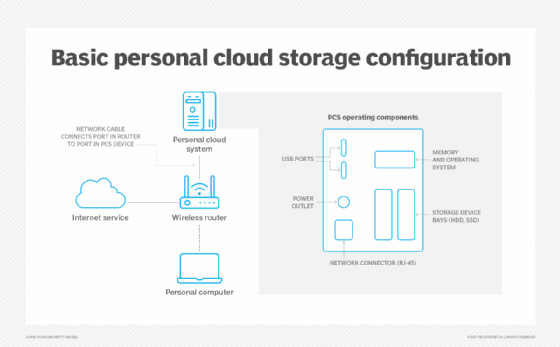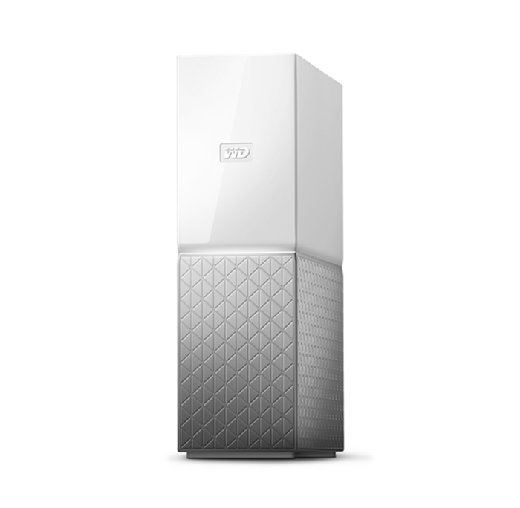What is personal cloud storage (PCS)?
Personal cloud storage (PCS) is a local network-attached storage (NAS) device that lets users store data, photos, music, videos and other files, and is optimized for media streaming.
PCS data storage devices allow home users to experience the advantages of high-capacity, cloud-based local storage without losing control of their data. Users can access content on their PCS device from multiple computers using a web browser, while mobile apps provide access from iOS and Android devices. Files can be shared without using a public cloud storage service. It is like having a private cloud that supports local and remote access to storage space.
PCS devices have a CPU, memory and operating system, and they use an Ethernet cord to plug into a Wi-Fi router. The most basic devices have one drive, store 1 TB to 2 TB of data, and are priced at around $200. More complex devices have dual drives with 16 TB or more of capacity and start at around $400.

Once the device and its components have been unboxed, setup is relatively simple. Following the instructions, start by powering up the device using its power cord. Connect a network cable to a port on the back of the router and the corresponding port on the PCS device to establish an internet connection. Log on to the PCS and enter a web address to start the process. Once the PCS website has been located, create an account and password. Next, search on the router for the PCS device in the same way as for locating a Wi-Fi service. Connect to the PCS device and launch the system. Moving files from one device, e.g., the PCS or another storage device, is as simple as using the drag-and-drop feature (e.g., as with Microsoft Explorer) or using the PCS system's own file management features.
Downloaded software or a web utility can assist with the device's setup and management. Mobile device apps enable device syncing, file sharing and access to content from smartphones and tablets. Users retain control of their data stored locally on the device, but they can access it from anywhere on the internet.
Some entry-level personal cloud storage devices come with installed drives. This makes it easier for new users to get started, as they do not need to separately obtain a storage device to mount in an available PCS bay. Other PCS systems are diskless, so users must buy drives (e.g., HDD or SSD) and install them in drive bays. More costly drives may include RAID (redundant array of independent disks) or JBOD (just a bunch of disks) packages that enable users to expand capacity when needed. They can also provide data backup in support of the installed drives.
Another approach to personal cloud-based storage is to use a physical or virtual server to run client-server software, such as OwnCloud, NextCloud or Seafile. These open source apps provide a DIY approach that requires users to install server software and download client software on computers and mobile devices that will access the files on the PCS. Devices are easy to configure and can optimize how storage is accessed and shared.
Personal cloud storage vendors and devices
Some of the vendors and their PCS products include the following:
- Asustor Lockerstor 2.
- Buffalo Technology LinkStation Series.
- QNAP Systems TS-230.
- Synology DiskStation DS220j.
- Terramaster F5-422 Network Storage Server.
- Western Digital My Cloud Home Personal Cloud.
Many of these vendors offer both single-drive and dual-drive versions, with single-drive devices having capacities up to 8 TB, and dual NAS devices providing 16 TB or more.
Pros and cons of public cloud vs. personal cloud storage
The main alternative to a personal cloud storage device is to subscribe to a cloud storage service, such as Google Drive, Microsoft OneDrive, Box or Apple iCloud, or any number of online backup services, such as Carbonite, Dropbox or iDrive.
With cloud storage, users don't have to make an upfront investment in hardware or software, but pricing will involve monthly or annual subscription fees for storage capacity above no-cost storage capacity levels. Cloud storage providers ensure that management and communications software is updated, while users take on that responsibility with a PCS device. Both approaches support scalability and real-time access to data.

PCS devices typically provide faster access to files than a cloud service provider. Data on a personal cloud storage device is secured with password protection and encryption; users know where their data resides at all times, who has access to it and how to delete it.
However, a PCS device doesn't have all the physical safeguards that are provided by a service provider's climate-controlled, secured data center with its many cloud servers and cloud computing services. PCS devices, by contrast, are vulnerable to damage or loss from a flood, fire and other disasters, and they can be stolen. Hard drive failure is an additional risk, so it's wise to have online backup in place for files stored on a PCS device.
Other downsides to using a personal cloud storage device include slow upload speeds when remotely accessing a home network. Also, depending on the amount of data stored, file syncing may not be an option. Given that, some files might have to be stored in the public cloud, requiring users to be online whenever they want access to those files.
Cloud services, on the other hand, are generally secure and unlikely to have major failures or disasters because data is copied across servers located across the country or around the world.
Most service providers offer several gigabytes of free storage; for instance, Google Drive offers 15 GB of free storage, while iCloud offers 5 GB. However, free space is limited, and once filled, users must subscribe for additional space.
Companies like iDrive and Carbonite offer consumers a range of storage capacities to back up documents, emails, music, photos and settings. Backups are continuous and automatic. However, these companies typically charge an annual fee that can escalate when backing up multiple devices.
File-sharing services such as Box and Dropbox also have personal cloud options. However, Box was created mainly for enterprise use, and Dropbox has become largely a workplace tool.
A disadvantage to cloud service is that users aren't in full control of their data because it's stored on the service provider's servers and backed up to different locations. When deleting data or files, users aren't fully assured that all the copies have been deleted.
Privacy can be a concern because providers have access to stored files and can scan file metadata. Under certain circumstances, such as when a subpoena or search warrant is issued, cloud service providers will give law enforcement agencies access to customer data and files.
Pros and cons of personal cloud storage vs. external storage
A PCS device is optimized to provide media center and file-sharing capabilities, while an external hard drive is for backup. Nevertheless, the two types of devices are similar: Both give users control over their data. Both are less expensive and, in many cases, faster than a cloud service. And they're both less likely to be targets of hacking exploits than a cloud service.
On the downside, both personal cloud storage devices and external drives are vulnerable to physical damage from fire, flood and other disasters, as well as theft and hard drive failure.
There are differences between the two types of devices, however. PCS devices are designed to easily and automatically store data from any connected device. While external hard drives can be used to back up multiple computers, it's more complicated to use them to back up multiple devices and smartphones.
Other capabilities PCS devices have that external drives don't always provide include media streaming features and the ability to access content from any web browser.
While many different options are available, potential users should have a good idea of their current and longer-term storage requirements. As such, a hybrid approach, combining a PCS with a cloud-based service, may be an effective approach.
Security concerns about using PCS
As noted, PCS resources are maintained and monitored by users which, at first glance, suggests a more secure operating environment. However, since the internet is part of the connection from the user's workstation or laptop to a PCS device, the potential for cyberattacks exists. Use of cybersecurity software, such as antivirus, antimalware and ransomware prevention is recommended. Two-factor and multifactor authentication should also be considered, along with network access protection from firewalls and intrusion detection systems and intrusion prevention systems.
Proactive due diligence protecting the PCS device and using the best available cybersecurity tools can reduce the likelihood of any cyberattacks and equipment damage.
Tips for selecting the right personal cloud storage product
With so many different PCS devices on the market, the selection process is critical. The following tips can help facilitate the selection of a PCS:
- Determine the appropriate storage capacity. Saving files and spreadsheets, for example, may not require as much storage as photos and high-definition videos.
- Number of drive bays. Some devices have storage already in place, simplifying the initial startup. Other devices have two or more drive bays in anticipation of greater storage requirements. For a PCS with multiple drive bays, it is possible to configure one drive bay to serve as a backup for drives installed in other drive bays.
- Types of drives to be used. Both hard disk and solid-state drive technology can be installed in drive bays. SSDs typically have greater capacity and faster access speeds than HDDs. RAID technology may be used, for example, and can be connected using one of the external USB ports.
- Connectivity interfaces. PCS devices will typically have an Ethernet port (using an RJ-45 plug) for connecting to a router and one or more USB ports for connecting external devices.
- Internal RAM. The amount of RAM built into the system can affect its overall performance. Many devices have fixed RAM that cannot be changed, while more expensive devices may permit RAM upgrades.
The impact of AI on the future PCS
As artificial intelligence (AI) affects virtually every aspect of IT, it will likely have a positive impact on PCS technology. Areas where AI may have the greatest impact include data management, cybersecurity, generating analytics for better storage management, automating data backup and retrieval, and freeing up storage space with data compression and data deduplication capabilities.
Considering the growth of PCS technology and its convenience and attractive price points, its use will likely continue in the coming years. Its main competition, cloud storage services, will also experience significant growth. Users must balance the pros and cons of each option when making storage decisions.
Check out the advantages and disadvantages of storing data in the cloud and common issues organizations encounter when creating a private cloud.






